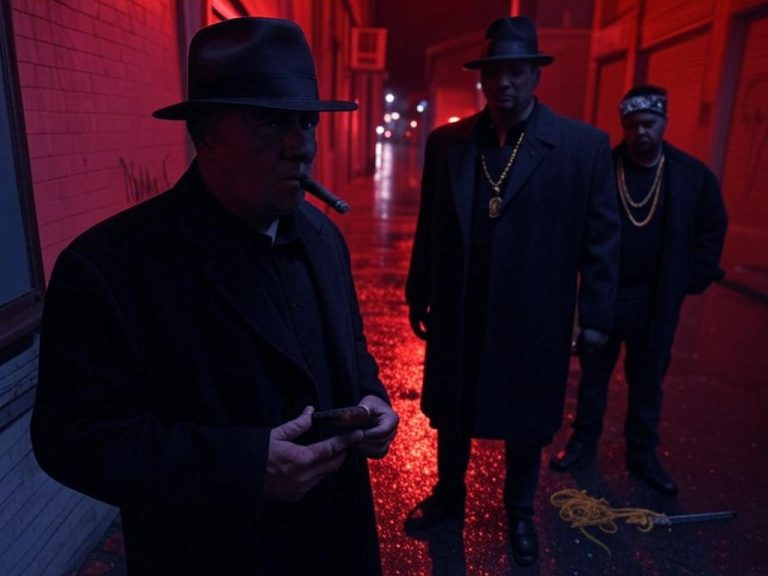By Michael McKown
Picture this: a dimly lit alley in Chicago, the kind where the streetlights flicker like they’re auditioning for a horror flick. Two figures huddle near a dumpster, one clutching a silenced pistol, the other puffing a cigar like it’s his last. “You sure about this, Vinny the Viper?” the gunman whispers, his voice tight. “Relax, Tommy Two-Times,” says Vinny, cool as ice. “Fat Joey’s been skimming the books. Boss says he’s gotta go.”
A quick pop-pop later, Fat Joey’s sprawled out, his nickname now a grim punchline. Gangster aliases like these aren’t just cool, they’re a code, a calling card, and sometimes a death sentence. Let’s unpack how mobsters get tagged with these monikers and toss some tips to you writers crafting tales of Italian-American wiseguys, Mexican cartel heavies, or Crips and Bloods street legends.
I’m Michael McKown (no relatives in Irish mobs, that I’m aware of), the boss of Ghostwriters Central, Inc. If your mob tale needs the help of a professional ghostwriter, whether for the theater, TV, a novel or even a stage play, we can do the work and you get the credit. How cool is that? Click a link to begin your journey. Your consultation is free. If you’re lucky, you can pay us in cigarettes and liquor.
Nicknames in the underworld are like tattoos: they stick, they mean something, and they’re usually earned. Take Italian-American mobsters, think “Tony the Tuna” or “Jimmy the Weasel.” These often come from physical traits, quirks, or a twisted sense of humor. Tony might’ve smelled like fish once after a botched smuggling gig, and Jimmy? He’s the guy who always squirms out of a jam.
The late John Gotti, dubbed “The Teflon Don,” got his handle because no charge would stick, until they did. Mobsters don’t pick these names at a baby shower; they’re forged in the streets, often by peers who spot something unforgettable. For writers, lean into that. A nickname should hint at a story, not just sound tough.
Now, swing south to the Mexican cartels, and the vibe shifts. Names like “El Chapo” (Shorty) for Joaquín Guzmán, or “El Mayo” (after his birth month) for Ismael Zambada, carry a different flavor, less playful, more mythic. These guys aren’t cracking jokes over pasta; their aliases often tie to power or practicality. “El Chayo,” Nazario Moreno González, leaned into a saintly image, even as he ran meth labs for Los Zetas. The lesson? Cartel nicknames can reflect geography, stature, or a calculated persona. Novelists, don’t overdo the menace, ground it in something real, like a childhood trait or a local legend, to keep readers hooked.
Then you’ve got the Crips and Bloods, where street cred rules. Here, names like “Monster” Kody Scott or “Tookie” Williams (founder of the Crips) scream attitude. “Monster” came from Kody’s brutal rep, eight shootings by age 20 will do that. “Tookie” was just a riff on Stanley’s beefy build, a nickname that stuck like gum on a shoe. These tags often bloom from bravado or a single wild moment. Screenwriters, listen up: don’t slap “Killer” on every thug. Pick something specific, like a scar, a hustle, a crazy night, and let it breathe. “Lil’ Spoon” beats “Big Death” if the guy’s always eating cereal at meetings.
So how do these names stick? Sometimes it’s a one-off. A guy trips over a cat during a heist, and bam, he’s “Catman” forever. Other times, it’s repetition. Tommy Two-Times didn’t stutter; he just hit every mark twice, methodical as a metronome. Humor’s a big player too. “Fat Joey” wasn’t a compliment, it was a jab that became his epitaph. For you writers, humor’s your secret sauce. A nickname that makes readers chuckle — “Pinky” for a guy missing a finger — stays with them longer than generic grit.
Here’s the advice, straight up: don’t force it. A good gangster nickname feels organic, not like you raided a thesaurus. Start with the character’s life. What’s their hustle? Their flaw? Maybe your Italian hitman loves opera, so call him “Tenor Tony.” Your cartel enforcer’s got a limp from a botched escape? “Cojo Carlos” (Lame Carlos) works. For a Bloods shot-caller, maybe he’s “Red Eye” after pulling all-nighters. Tie it to their world. Food for Italians, saints or slang for Mexicans, street swagger for gangs. And keep it short. “Salvatore the Sardine-Scented Soprano” is a mouthful nobody’s saying twice.
One last tip: let the nickname evolve. Early on, your wiseguy’s “Baby Face” because he looks 12. After he torches a rival’s warehouse? “Baby Flame.” It’s a journey readers can follow. Test it in dialogue too. Does it roll off the tongue? “Pass the cash, Baby Flame,” sounds better than “Hey, Arsonist Infant, move it.” Real mobsters don’t overthink this stuff, so neither should you. Keep it raw, keep it fun, and let the name do the heavy lifting.
Now go write that script — Vinny the Viper’s waiting.

